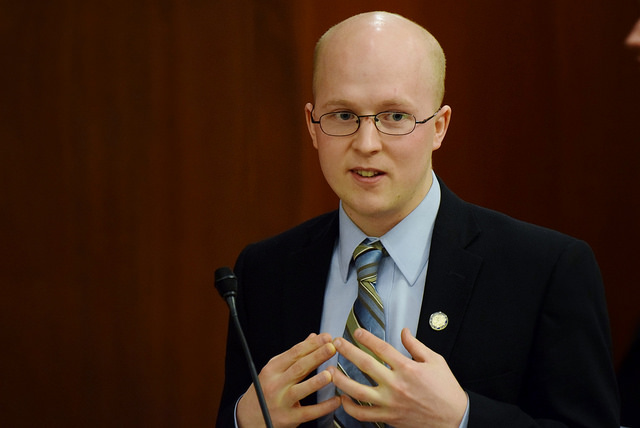
Petersburg’s representative in the Alaska House says he’s prioritizing a spending cap on the earnings of the Alaska Permanent Fund in the upcoming legislative session. Sitka Democrat Jonathan Kreiss-Tomkins says the theme of this year’s gathering of law makers in Juneau is “massive uncertainty” with no organization in place yet and no change in the state’s fiscal problems.
Kreiss-Tomkins returns to Juneau for his fifth term, his ninth year in the Alaska House. One week before the start of the session he did not yet know if he’d be in a House majority or minority.
“There’s a very good chance that when we show up to be sworn in that there will not be a president of the senate or a speaker of the house with a majority of votes and that we’re just in sort of perfect gridlock,” Kreiss-Tomkins said in early January.
By last month it looked like an even 20-20 split in the house with Republicans on one side, and a mix of Democrats, Independents and one Republican planning to caucus together on the other. It was just two years ago that a bi-partisan coalition didn’t get organized in the House until the middle of February. Without that organization lawmakers aren’t assigned to committees and bills don’t get hearings. Kreiss-Tomkins said it was governor Dunleavy’s budget proposal that galvanized that coalition in 2019. He said nothing has changed with the state’s fiscal situation and is not positive about the latest budget proposal from the Dunleavy administration.
“It’s not a balanced budget and he’s basically proposing a budget that steals the wealth of future generations of Alaskans by spending down the Permanent Fund,” Kreiss-Tomkins said.
Kreiss-Tomkins said the Alaska Permanent Fund is his focus this session. He’s put forth several bills in a first batch of prefiled legislation released January 8th. Among those is a proposed amendment to the state constitution capping the amount that can be spent out of the earnings of the Alaska Permanent Fund.
“So that the whims and caprices and irresponsible impulses of any legislature to spend down the permanent fund for whatever reason, it could be a government program, a piece of infrastructure, a permanent fund dividend, whatever, it has to be kept within a sustainable amount,” Kreiss-Tomkins explained.
That amount would be capped at a rolling five percent average of the market value for the fund. Lawmakers set a similar cap in statute in 2018 but that can be changed by new budget decisions. A constitutional amendment, requiring voter approval, would mean courts could throw out a bigger draw from the fund’s earnings.
The Sitka Democrat wants more consideration of other new revenue sources to pay for state government. Kreiss-Tomkins supports a state income tax. He voted for it in 2017 and wished it had passed the Senate that year. It’s being proposed again this year.
“It’s basically mathematically impossible to think about Alaska’s budget without some form of broad-based revenue and I much prefer an income tax to sales tax,” he said.
Two other Kreiss-Tomkins prefiled bills he said are resurrected from last session. One would recognize public school teachers who have achieved national board certification. Another bill that would aid in creation of non-English language immersion programs in Alaska schools.
Kreiss-Tomkins said he’ll support reauthorizing a sport fishing license surcharge that until last year was a source of funding for king salmon production at Crystal Lake Hatchery near Petersburg.
“I’ve done some intelligence gathering on this,” Kreiss-Tomkins said. “There’s broad support for extending the surcharge. There may be opposition from Kenai River Sportfishing Association, which is kind of the arch-nemeses of commercial fishing in Alaska but we’ll navigate that if needed.”
The Dunleavy administration’s bill to extend that funding passed the house with some opposition but did not move out of the senate before legislators left Juneau.
The representative also wants to pursue last fall’s recommendations from the Alaska Marine Highway Reshaping Work Group.
“I appreciate the task force’s work on the ferry system,” he said, adding, “It’s such a mess. And I really would like to pivot from sort of a study and discourse to action and solutions on the ferry system, we’re past due.”
One thing Kreiss-Tomkins isn’t piling on for concerns about the upcoming session is pandemic precautions. He praises the procedures and protocols implemented by legislative staff, including COVID testing and allowances for remote voting.
The first session of the 32 Alaska legislature gavels in Tuesday, January 19.











